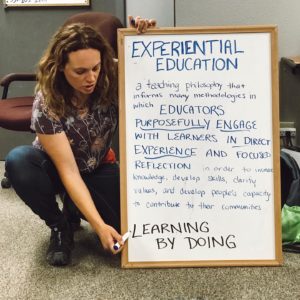Experiential Education
Experiential Education at COR
 Experiential education is the theory of education wherein the students learn by doing and by participating. This model of learning requires students to be engaged in an activity or discussion, reflect upon what they did or discussed, formulate a theory or hypothesis, and then test that theory by acting on it. This process can be repeated as often as necessary to formulate an accurate theory.
Experiential education is the theory of education wherein the students learn by doing and by participating. This model of learning requires students to be engaged in an activity or discussion, reflect upon what they did or discussed, formulate a theory or hypothesis, and then test that theory by acting on it. This process can be repeated as often as necessary to formulate an accurate theory.
Experiential education has two major advantages over a more lecture-based education system. One, students are more active in the learning process and therefore are more engaged and invested in learning. They are more likely to experiment, ask questions, and understand the topic on a deeper level. Two, they are engaged in more than one “way of learning.” There are about ten different “ways of learning” but the three major ones, which everyone uses to some extent, are auditory, visual, and kinesthetic.
No one uses only a single method of learning; everyone learns through a combination of these different “ways.” However, for each person, there is one most effective method for learning. -Experiential education naturally combines these “ways of learning” so that the lesson is not only approachable by students with different methods, but is more likely to be remembered because the student is learning the same thing in multiple “ways.”